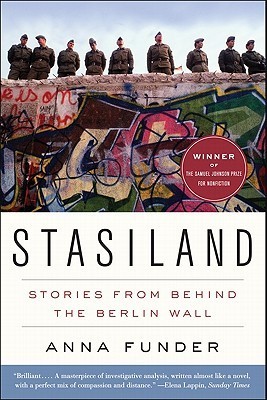More on this book
Community
Kindle Notes & Highlights
by
Anna Funder
Read between
October 19 - October 26, 2022
To remember or forget—which is healthier? To demolish it or to fence it off? To dig it up, or leave it lie in the ground?
What were the dangers of knowing? Or the dangers of ignoring the past and doing it all again, with different coloured flags or neckerchiefs or helmets?
There is an art, a deeply political art, of taking circumstances as they arise and attributing them to your side or the opposition, in a constant tallying of reality towards ends of which it is innocent.
In the GDR people were required to acknowledge an assortment of fictions as fact. Some of these fictions were fundamental, such as the idea that human nature is a work-in-progress which can be improved upon, and that Communism is the way to do it. Others were more specific: that East Germans were not the Germans responsible (even in part) for the Holocaust; that the GDR was a multi-party democracy; that socialism was peace-loving; that there were no former Nazis left in the country; and that, under socialism, prostitution did not exist.
Lately, a study has suggested that depressed people have a more accurate view of reality, though this accuracy is not worth a bean because it is depressing, and depressed people live shorter lives. Optimists and believers are happier and healthier in their unreal worlds.
‘That calendar was printed in mid-1990. After the Wall came down. It was printed because, even at that late stage, people here could not believe that the nation would simply cease to exist. Despite all the evidence, they thought the GDR would go on as an independent country, with an army and a border guard of its own.
There are strange moments where the present already belongs to your past—your last day at work, for instance, when problems and politics there become a tale told in the third person.
The Stasi had used radiation to mark people and objects it wanted to track. It developed a range of radioactive tags including irradiated pins it could surreptitiously insert into a person’s clothing, radioactive magnets to place on cars, and radioactive pellets to shoot into tyres.
‘You can’t let it eat you up, you know, make you bitter. You’ve got to laugh where you can.’
The only way to make sense of its name is to understand the Stasi as defending the government against the people.
‘We never thought, no-one ever thought, that it would all come to an end,’ he says. ‘It would not have occurred to anyone that our country could somehow cease to be. Just like that!
‘There are no people who are whole,’ he says. ‘Everyone has issues of their own to deal with. Mine might be a little harder, but the main thing is how one deals with them.’


